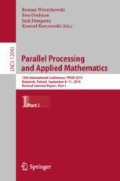Abstract
A new factorization of orthogonal matrices is proposed that is based on Givens-Jacobi rotations but not on the QR decomposition. Rotations are arranged more uniformly than in the known factorizations that use them, so that more rotations can be computed in parallel, and fewer layers of concurrent rotations are necessary to model a matrix. Therefore, throughput can be increased, and latency can be reduced, compared to the known solutions, even though the obtainable gains highly depend on application specificity, software-hardware architecture and matrix size. The proposed approach allows for developing more efficient algorithms and hardware for generating random matrices, for optimizing matrices, and for processing data with linear transformations. We have verified this by implementing and evaluating a multithreaded Java application for generating random orthogonal matrices.
Access this chapter
Tax calculation will be finalised at checkout
Purchases are for personal use only
References
Anderson, T., Olkin, I., Underhill, L.: Generation of random orthogonal matrices. SIAM J. Sci. Stat. Comput. 8(4), 625–629 (1987)
Arioli, M.: Tensor product of random orthogonal matrices. Technical report RAL-TR-2013-006, Science and Technology Facilities Council (2013)
Benson, A.R., Gleich, D.F., Demmel, J.: Direct QR factorizations for tall-and-skinny matrices in MapReduce architectures. In: Proceedings of the IEEE International Conference on Big Data, pp. 264–272, October 2013
Diaconis, P., Forrester, P.J.: Hurwitz and the origins of random matrix theory in mathematics. Random Matrices Theory Appl. 6(1), 1730001 (2017)
Frerix, T., Bruna, J.: Approximating orthogonal matrices with effective Givens factorization. In: Proceedings of the 36th International Conference on Machine Learning (ICML), Long Beach, CA, 9–15 June 2019, pp. 1993–2001 (2019)
Genz, A.: Methods for generating random orthogonal matrices. In: Niederreiter, H., Spanier, J. (eds.) Monte-Carlo and Quasi-Monte Carlo Methods 1998, pp. 199–213. Springer, Heidelberg (2000). https://doi.org/10.1007/978-3-642-59657-5_13
Hofmann, M., Kontoghiorghes, E.J.: Pipeline Givens sequences for computing the QR decomposition on a EREW PRAM. Parallel Comput. 32(3), 222–230 (2006)
Johnson, K.T., Hurson, A.R., Shirazi, B.: General-purpose systolic arrays. Computer 26(11), 20–31 (1993)
Merchant, F., et al.: Efficient realization of Givens rotation through algorithm-architecture co-design for acceleration of QR factorization, March 2018. http://arxiv.org/abs/1803.05320
Mezzadri, F.: How to generate random matrices from the classical compact groups. Not. Am. Math. Soc. 54(5), 592–604 (2007)
Modi, J.J., Clarke, M.R.B.: An alternative Givens ordering. Numer. Math. 43(1), 83–90 (1984). https://doi.org/10.1007/BF01389639
Parfieniuk, M., Petrovsky, A.: Structurally orthogonal finite precision implementation of the eight point DCT. In: Proceedings of the IEEE International Conference on Acoustics, Speech, Signal Processing (ICASSP), Toulouse, France, 14–19 May 2006, vol. 3, pp. 936–939 (2006)
Parfieniuk, M., Park, S.Y.: Versatile quaternion multipliers based on distributed arithmetic. Circuits Syst. Signal Process. 37(11), 4880–4906 (2018)
Pinchon, D., Siohan, P.: Angular parameterization of real paraunitary matrices. IEEE Signal Process. Lett. 15, 353–356 (2008)
Pinheiro, J.C., Bates, D.M.: Unconstrained parametrizations for variance-covariance matrices. Stat. Comput. 6(3), 289–296 (1996)
Sun, X., Bischof, C.: A basis-kernel representation of orthogonal matrices. SIAM J. Matrix Anal. Appl. 16(4), 1184–1196 (1995)
Vaidyanathan, P.P., Doğanata, Z.: The role of lossless systems in modern digital signal processing: a tutorial. IEEE Trans. Educ. 32(3), 181–197 (1989)
Acknowledgments
This work was financially supported from the Polish Ministry of Science and Higher Education under subsidy for maintaining the research potential of the Faculty of Mathematics and Informatics, University of Bialystok.
Author information
Authors and Affiliations
Corresponding author
Editor information
Editors and Affiliations
Rights and permissions
Copyright information
© 2020 Springer Nature Switzerland AG
About this paper
Cite this paper
Parfieniuk, M. (2020). A Parallel Factorization for Generating Orthogonal Matrices. In: Wyrzykowski, R., Deelman, E., Dongarra, J., Karczewski, K. (eds) Parallel Processing and Applied Mathematics. PPAM 2019. Lecture Notes in Computer Science(), vol 12043. Springer, Cham. https://doi.org/10.1007/978-3-030-43229-4_48
Download citation
DOI: https://doi.org/10.1007/978-3-030-43229-4_48
Published:
Publisher Name: Springer, Cham
Print ISBN: 978-3-030-43228-7
Online ISBN: 978-3-030-43229-4
eBook Packages: Computer ScienceComputer Science (R0)

